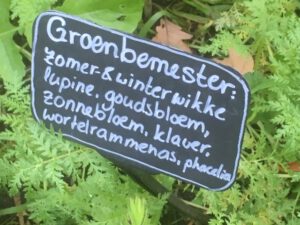 The first weekend of November, we went on a bike excursion to the Ommuurde Tuin in Renkum. Some of us had seen this market garden in other seasons, but there were also a lot of people who were there for the first time. Elske Hageraets, one of the main farmers, first offered us some tea, coffee and cake, and then we sat down around the campfire to have a chat. She told the group how the garden came to be – it used to be the garden of the wife of the king Willem III – and how Esther started the market garden, where now more than 400 different vegetables, fruits and herbs are grown. With this produce, the farmers prepare weekly veggie bags for their clients, but they also sell the vegetables in their shop and make lunch for visitors. Soil fertility is one of the main focus points of the gardeners, and over time the organic matter of the soil has increased significantly. Elske also talked about how she, during her studies at Wageningen Univesrity, found out that she didn’t want to spend her life behind a desk, but that she wanted to do something practical, to have her hands in the soil and actually produce something tangible and necessary for life. This struck a cord with the group, especially with the participants who came specifically because they themselves wanted to start a farm together after their studies.
The first weekend of November, we went on a bike excursion to the Ommuurde Tuin in Renkum. Some of us had seen this market garden in other seasons, but there were also a lot of people who were there for the first time. Elske Hageraets, one of the main farmers, first offered us some tea, coffee and cake, and then we sat down around the campfire to have a chat. She told the group how the garden came to be – it used to be the garden of the wife of the king Willem III – and how Esther started the market garden, where now more than 400 different vegetables, fruits and herbs are grown. With this produce, the farmers prepare weekly veggie bags for their clients, but they also sell the vegetables in their shop and make lunch for visitors. Soil fertility is one of the main focus points of the gardeners, and over time the organic matter of the soil has increased significantly. Elske also talked about how she, during her studies at Wageningen Univesrity, found out that she didn’t want to spend her life behind a desk, but that she wanted to do something practical, to have her hands in the soil and actually produce something tangible and necessary for life. This struck a cord with the group, especially with the participants who came specifically because they themselves wanted to start a farm together after their studies.
Fabian Kemps Verhage, who last year started an organic and vegan arable farm, was also visiting the Ommuurde Tuin that Saturday, and he told his story about why he decided to become a farmer, and the misfortunes that he had encountered along the way.
Then it was time for the tour around the garden. There were less crops than in spring and summer, which could be expected, but it was still very interesting to see the bio pest control methods the farmers use to protect the cabbages, for example. We also had a chat about the cover crops, which are a perfect mixture of green manure crops and nitrogen fixers, all to make the soil more fertile.
All in all, it was a very interesting afternoon. We got to understand better what it is like to be a small-scale peasant farmer in these times, we saw what happens in preparation for winter time and we also had a nice chat with all the participants about if and how they saw their future as farmer.

